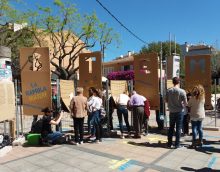Games for Social Change places city neighbors at the center of a research process devoted to co-create data-based policies to improve the urban quality of life. Relevant social issues are tackled by sharing behavioural data collected through digital platforms placed in public space and where citizens freely and consciously participate to a collective experiment.

The project builds on citizen science strategies and proposes public interventions in urban spaces that confront the citizens with the dilemmas raised by their neighbors. Shared social concerns such as as air quality and environmental justice, social inclusion, gender discrimination and violence, the use of public space, the need to react to a serious coastal pollution due to a oil spill or the roles of each member of the mental health community care are raised by specific groups and placed in public. The effort is made through group discussions and the engagement of a variety of stakeholders. They all cocreate collective experiments that want to empower specific communities.
Social dilemmas are used to address the conflict between individual and collective interests, providing quantitative measures of the norms that shape community social interactions. Social dilemmas and game theory model trust, cooperation, reciprocity, sense of collectivity, optimism and many other social traits. By moving the experimental setup in the public space and encouraging citizens participation with electronic tablets and attractive physical infrastructures, the citizens become knowledge co-producers.
Within the emergent field of citizen science, we align the effort with the need to respond to social concerns raised by groups and collectives with data and evidences gathered from social interactions. Therefore, collective experiments been developed have the potential to not only understand how we interact, but also which is the influence of social and contextual factors on the adaptation, vulnerability and resilience of individuals with regard to specific social issues within a given community.
The interventions can be understood as a way to open up the debate on specific social issues within a city or a neighborhood since social dilemmas are also a self-reflection tool. They can also be understood as a way to make some communities present and visible in the public space in front of other neighbors and finally as a way to obtain socially robust data that can support collective actions or new policies for social change.